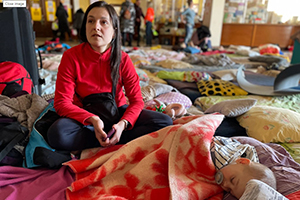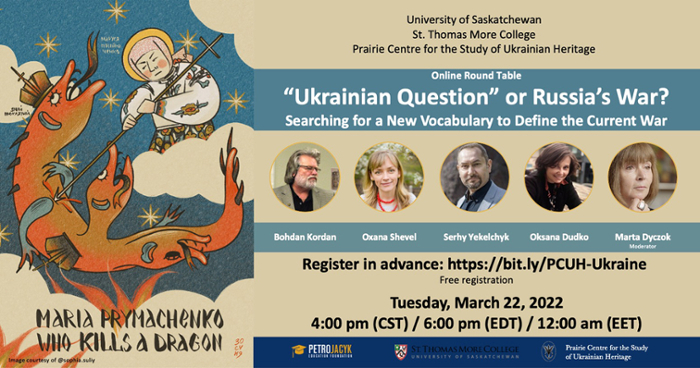
Searching for words to describe Russian aggression in Ukraine
Round table tackles ‘Ukrainian Question” or Russia’s War?: Searching for a New Vocabulary to Define the Current War
By Paul SinkewiczWar between Russia and Ukraine was already far from an academic exercise for Dr. Oksana Dudko.
The historian from Lviv, Ukraine, like her fellow citizens, has been grappling since 2014 with the reality of a shooting war with Russia in the Donbas region in the east of the country, and its annexation of the Crimea region in the south.
All the while, she has been working on her doctoral dissertation and further studies in Canada that led her to accept the Petro Jacyk Post-Doctorial Fellowship at St. Thomas More College.
One month ago, her world was turned upside down. She was forced to return home amid the full-scale Russian invasion of her country, where she saw first-hand the pain and terror of war.
“My friend's daughter was so traumatized by the war that she refused to talk for days. My other friend’s kids had mental breakdowns, because of the constant sirens and shelling,” Dudko told participants from her home in Lviv in an online panel on March 7.
She was seeing hundreds of thousands of refugees flee from the fighting as they transited through Lviv to neighbouring countries.
“People keep shaking, even after they arrive in safe places in Warsaw or other cities, because of what they have experienced,” she said. “It will take decades to recover.”
Despite all that, Dudko has continued with her academic work, pushing ahead with an already planned round table on Ukraine, as part of her fellowship work at STM.
Hosted by Dr. Nadya Foty-Oneschuk, Interim Director, Prairie Centre for the Study of Ukrainian Heritage (PCUH), the online round table took place on March 22. Titled ‘Ukrainian Question” or Russia’s War?: Searching for a New Vocabulary to Define the Current War.
“It was uncertain until very recently if it would go ahead at all, given that Dr. Oksana Dudko, our Jacyk Petryk Post-Doctoral Fellow in Ukrainian Studies, and this event’s organizer, travelled back to Ukraine only a few short weeks ago,” said Foty-Oneschuk. “We are infinitely grateful for her safety, and also for her perseverance in forging ahead with this event despite the circumstances she now finds herself in.”
Taking part in the round table were Moderator Dr. Marta Dyczok, Associate Professor at Western University, Dr. Oxana Shevel, Associated Professor of Political Science from Tufts University, Serhy Yekelchyk, Professor at University of Victoria and historian, and Bohdan Kordan, Professor Emeritus, St. Thomas More College, historian and former Director of PCUH.
Dudko said the inspiration for the round table initially came much earlier. Her doctoral dissertation when she was still studying in Ukraine was dedicated to the so-called Ukrainian Question in international politics at the end of the 19th and the beginning of the 20th century.
She said the focus of the round table changed drastically with Russian President Vladimir Putin’s assertion on Feb. 21, 2022 – the eve of the full-scale invasion of Ukraine - that the question of Ukraine’s history and nationhood must finally be solved by making Ukraine a part of the Russian world.
“Putin’s imperial drive to solve the ‘Ukrainian Question’ is not a new one,” Dudko said. “It has been ongoing since 2014 with the annexation of Crimea by Russia, and the subsequent war in the Donbas region.”
“That’s why I decided to organize this round table. However, I hope that challenging Putin’s old-school framing of Russia’s invasion as a solution will help us to understand Russia’s new imperial glossary. And I hope that it will also explore a wider vocabulary of words which are used by politicians and the media and in Ukraine and in the West to refer to the war in Ukraine.”
The full round table discussion is available to watch HERE.
SEE ALSO:
Hidden room above Lviv train station shelters traumatized Ukrainian women and babies

